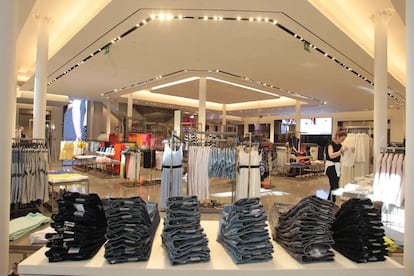What shopping at Zara will be like in 2025: No stops at cash registers to remove alarms from clothing
The company, which is owned by Spanish group Inditex, will eliminate all hard plastic alarms from its garments by the end of 2024

Zara will replace the rigid alarm devices on garments with a new mechanism. For years, Inditex has been obsessed with the question of how to organically integrate the physical retail experience with the online shopping experience, and vice versa. It has sought ways to make the two opposing shopping methods coexist without cannibalizing each other but feed into each other instead. The process to facilitate that approach began in 2014 with the arrival of RFID radiofrequency technology in Zara factories and warehouses to be used on its garment labels. The goal is to have the items identified and located at all times, in order to manage a huge inventory, unit by unit, in real time.
That is now the basis of Zara’s integrated model, which has enabled the company to break sales records each quarter. Now, the Spanish textile group is further developing this technology to give a new twist to its business model. It is eliminating the classic rigid plastic alarms and replacing them with another type that is practically imperceptible to the customer. Like the current alarms, they also work through radiofrequency, but they do not need to be inside a piece of plastic attached to the garment. This is one of the most important innovations that Inditex has implemented to modernize the shopping experience in its physical stores. This model will be in place in all Zara garments within a year.
Company management confirmed this new direction on Wednesday, following their presentation of the corporation’s mid-year results. In March, Inditex announced that it intended to effect the change, and in June Zara said that the first stage would begin this summer. Indeed, in July, Inditex installed the necessary technical infrastructure for the new system, such as RFID radiofrequency antennas, in Zara stores. This technology replaces the hard plastic alarms that include a chip in a garment or on the label. The bottom line for customers is that it will no longer be necessary to remove the alarm from the garment at the time of purchase at cash registers or self-checkout machines, as they must currently do; the new method will deactivate the alarm via radiofrequency, reducing the amount of time spent in the payment process by up to 50%.

The company has now begun testing this new system, a process that coincides with the start of the brand’s autumn-winter campaign. Once the testing period is over, it will proceed to progressively replace the old alarms over the course of the next year. It is worth noting that Inditex puts some 600,000 tons of clothing on the market, and that Zara accounts for around 75% of its sales.
Shopping at Zara’s most modern stores, such as the one that opened a few months ago in Madrid’s Plaza de España, now requires almost no interaction with its salesclerks. The elimination of physical alarms promises to make purchases go even faster. In fact, when using the app and the Pay & Go system, it is not even necessary to go through a cashier to pay, as it can be done by scanning the garment’s code. However, it is still necessary to stop and deactivate the alarm, a step that the new system is intended to speed up. Other elements must also be incorporated, such as the fully automated collection boxes for online orders, which require only the app and a QR code; the mailboxes for returning garments, which use the same system; the aforementioned self-checkout stations; and the reservation of fitting rooms, which can also be done through the app.
One priority that Inditex CEO Óscar García Maceiras has identified for “reaching the next level” of growth is “optimizing the customer’s experience.” Thus, “the new technology will mean a significant improvement in customer experience, facilitating interaction with our products and improving the purchasing process,” he said in March. At the time, he anticipated that the system would be implemented across all formats. Once the process is completed at Zara, it will be implemented elsewhere.
The company claims that the process “meets our expectations perfectly …[there haven’t been] any major incidents.” A few days ago, Bloomberg reported that Inditex had discovered some thefts of garments that have the new labels, as they can be easily removed. But the company insists that “there have been no significant incidents.”
Sign up for our weekly newsletter to get more English-language news coverage from EL PAÍS USA Edition
Tu suscripción se está usando en otro dispositivo
¿Quieres añadir otro usuario a tu suscripción?
Si continúas leyendo en este dispositivo, no se podrá leer en el otro.
FlechaTu suscripción se está usando en otro dispositivo y solo puedes acceder a EL PAÍS desde un dispositivo a la vez.
Si quieres compartir tu cuenta, cambia tu suscripción a la modalidad Premium, así podrás añadir otro usuario. Cada uno accederá con su propia cuenta de email, lo que os permitirá personalizar vuestra experiencia en EL PAÍS.
¿Tienes una suscripción de empresa? Accede aquí para contratar más cuentas.
En el caso de no saber quién está usando tu cuenta, te recomendamos cambiar tu contraseña aquí.
Si decides continuar compartiendo tu cuenta, este mensaje se mostrará en tu dispositivo y en el de la otra persona que está usando tu cuenta de forma indefinida, afectando a tu experiencia de lectura. Puedes consultar aquí los términos y condiciones de la suscripción digital.









































